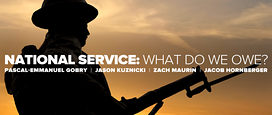Lead Essay
Pascal-Emmanuel Gobry argues that libertarians ought to support compulsory military service, at least in principle, as a means of defending a free society. While it is true that such service entails compulsion, it is also true that the freest peoples in all of history have relied upon it.
Compulsory service would have some good public choice effects as well. In particular, it would change the incentives in the decision to go to war: When all must bear the sacrifice, wars will be fewer and less deadly. Finally, Gobry notes that our ancestors commonly bore similar burdens, and we owe them a debt of gratitude — one he believes is best discharged by following in their footsteps.
Response Essays
In a vehement dissent, Jason Kuznicki argues that the so-called libertarian case for compulsory military service is an illusion. To the ancients, liberty meant something very different, and we should reject their definition, which rests on militarism and compulsion. Our liberty rests on commerce, not on conquest. Taxes are at best a necessary evil, and conscription is always worse than taxation. Moreover, it is not at all apparent how we might settle a debt of gratitude with the past. If we even have one.
Zach Maurin argues that what we need now is not universal military service, but universal civilian service. In his proposal, this service will not be legally required, but it will be federally subsidized and available to all who want it. He argues that there are many ways the United States could be made better, and he suggests that civilian service is the way to accomplish these goals, from feeding the hungry, to education, to health care.
Jacob Hornberger asks what the advocates of compulsory national service would do with determined resisters: Are they prepared to use force? If resistance continues, are they prepared to kill? Hornberger insists on the moral right to resist coercion, regardless of the nobility of the cause for which it is deployed. To him, it is a question of trust: Can free people be trusted to take care of themselves and their society? Or do they require some coercion? If they are coerced, they are not free, he concludes.
The Conversation
Related at Cato
Commentary: “A ‘National Service’ Revival Will Serve the State, Not the People,” by Doug Bandow, July 1, 2013.
Commentary: “A New Military Draft Would Revive a Very Bad Old Idea,” by Doug Bandow, July 16, 2012.
Radio: Tad DeHaven discusses the national service act on WOR’s The John Gambling Show, April 7, 2009.

